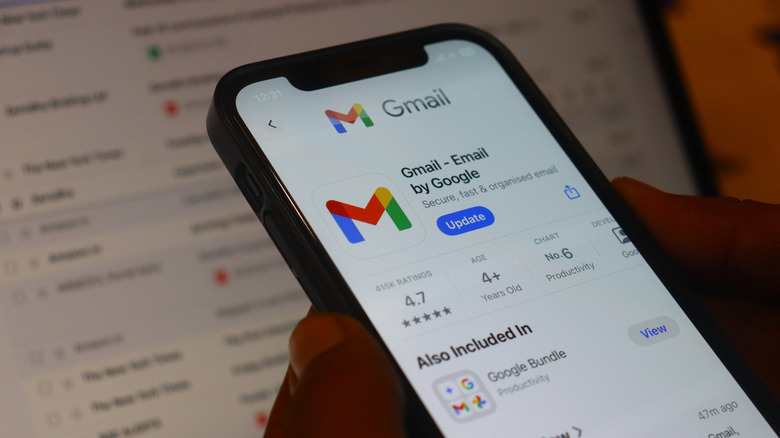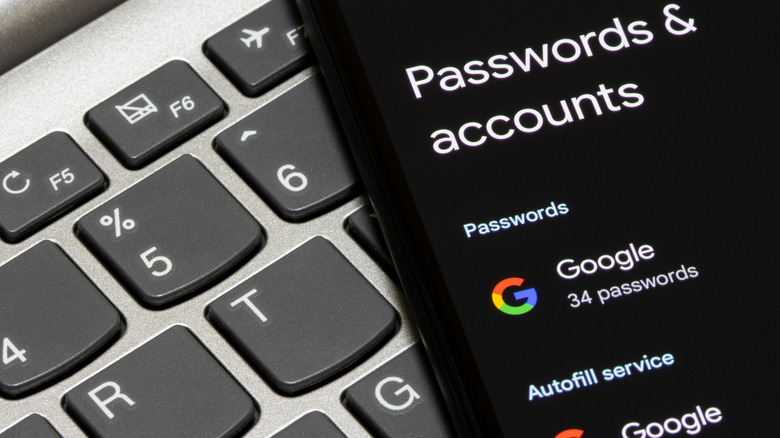How To Check If Your Gmail Account Password Has Been Compromised In Any Massive Leaks
There's no denying that Google's software products have become an indispensable part of people's everyday lives. The company's email service — Gmail — started as an April Fool's Day joke, but has been around for over 20 years, and remains one of the world's widely used email platforms. Other services like Google Photos, Docs, Maps, YouTube, and Google Chrome are so entrenched in people's lives that many would struggle to function without them. In fact, a large part of people's digital presence and online identity is tied to their Google Account.
To make life easier for its users, Google lets users access its services using a Google Account. So, whoever signs up for Google's email service (Gmail) doesn't need to sign up separately to gain access to the rest of Google's services. While this is massively convenient, it also opens the possibility of losing access to your entire Google Account should a hacker gain access to your Gmail account. It is, therefore, extremely important that one keeps their Gmail user ID and password safe, secure, and takes all possible precautions to ensure that the all-important Gmail login credentials don't fall into the wrong hands.
However, despite your best efforts, there could be times when your Gmail (and therefore Google Account) password is compromised. In many cases, it might not even be your fault, given the sheer regularity with which massive data breaches happen. While this is a reality of modern-day digital life, there are several ways to check whether your all-important Gmail password has been exposed. Besides Google's own password checkup service, there are third-party tools that can help you figure out whether your username and password have been leaked to hackers or malicious actors.
How to use Google's Password Checkup tool
The quickest and simplest way to check whether your Gmail account password has been compromised is to use Google's own Password Checkup tool by clicking here. Once you're on the Password Checkup page, click on the option that says "Check Passwords". Clicking "Check Passwords" will take you to a login page where you'd be asked to enter your Gmail account credentials to verify your identity.
Once signed in, Google will perform an automatic scan, which lasts a couple of seconds. If Google identifies your passwords as being compromised, you will see a list of websites under the "Compromised Passwords" section. To verify if your Gmail password has been compromised, you need to manually scroll through each of the listed websites and look for the "Google.com" domain and the Gmail.com email address.
If you spot your Gmail account on the list, you will also see a "Change password" option right next to it. Clicking on it will take you to Google's password reset page. On this page, you can change your old password to one that's stronger, which will immediately improve the security of your Gmail account.
Once you change your password, you can use additional security options from Google, including two-factor authentication and Google passkeys, to further fortify your account. While you are at it, you'll also see a list of compromised passwords for other tools and services you use. It is always a good idea to change the credentials for those websites as well.
Third-party websites that tell you if you have a compromised Gmail password
If you have several Gmail addresses and need to quickly check whether the passwords associated with those accounts have been compromised, there are several websites that let you do it. Among the notable ones are Have I Been Pwned, Avast Hack Check, LeakCheck, ScatteredSecrets, and F-Secure Identity Theft Checker. All these tools are simple to use, and all you need to do is enter your Gmail address, hit the search button, and check whether any of these websites show your Gmail credentials as being compromised. Note that you can use all of these listed tools to check for compromised passwords for other email services, including iCloud Mail, Yahoo Mail, and Outlook.
If you happen to use a password manager service like Dashlane, 1Password, Bitwarden, or NordPass to manage all your passwords, these usually also have a built-in password breach checking tool. Opening any of these apps on your computer or smartphone and navigating to the password breach checker will also help you quickly verify whether your Gmail ID credentials have been compromised. Regardless of which tool you end up using, it is extremely important that you change your compromised credentials as soon as they are detected.



